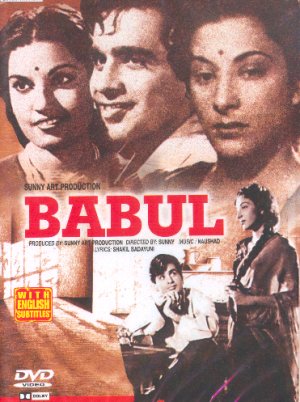- Babul (1950 film)
Infobox Film
name = Babul

image_size =
caption =
director =S.U. Sunny
producer =Naushad
writer =Azmi Bazidpuri
narrator =
starring =Ashok Kumar ,Nalini Jaywant
music =Naushad
cinematography = Fali Mistry
editing = Moosa Mansoor
distributor =
released = 1950
runtime = 142 minutes
country = IND
language = Hindi
budget =
gross =
preceded_by =
followed_by =
website =
amg_id =
imdb_id =0331186"Babul" (
Hindi : बाबुल,Urdu : بابُل) or ("Father's House") is a 1950Bollywood film directed byS.U. Sunny produced and with music direction byNaushad . The film starsDilip Kumar andNargis . A box-office success, the film became the second highest earning film of 1950, earning an approximate gross of Rs. 1,25,00,000 and a nett gross of Rs. 70,00,000. [cite web|author=Box Office India|title=Top Earners 1950|url=http://www.boxofficeindia.com/showProd.php?itemCat=155&catName=MTk1MA|publisher=boxofficeindia.com|accessdate=July 9|accessyear=2008]Plot
The film relates the story of a young man named Ashok (
Dilip Kumar ) who is in love with two different women from very different classes. Ashok hails from a wealthy family and has a job as a postmaster, but it is clear that his job requires little hard labor, aside from sending an occasional telegram, leaving him time to enjoy his comforts andplayboy lifestyle, with his suits,cigarette s,painting and song writing and love for women. A girl named Bela, the poor and simple daughter of the former postmaster woos for his affections and is supported by her father who wants them to marry. Bela prepares his meals, teases and amuses him, and dreams of a longterm happy marriage. However, Bela has competition from the wealthylandowner Jamnadas's daughter Usha, who lives a lavish lifestyle in a hilltopmansion Usha, drives a foreign car and seems more suitable for Ashok the young postmaster. They share a love of fine art and music, and Usha falls in love with his singing and arranges for him to give her music lessons on hergrand piano in aboudoir adorned with fine art. Bela, heartbroken, intervenes by revealing to Usha her misguided belief that Ashok has already professed his love for her. In a surprising display of class-transcending understanding, she agrees to renounce her love for Ashok in favor of Bela’s claim, and to accept a proposal from thearistocratic son of one of her father’s colleagues. As Usha’s wedding approaches, both she and Ashok become depressed and Bela has recurringnightmare s of a black-veiled rider coming to carry her away. Times become increasingly unhappy and it seems that their marriage plans will not go ahead as plannned.Cast
*
Nargis ... Bela
*Dilip Kumar ... Ashok
*Munawar Sultana ... Usha
*Jankidas ... Ashok's dad
*Tun Tun ... Tun Tun (Munshi's daugther) (as Uma Devi)
*H. Pahadi
*Vinod
*Ismail
*Amar
*A. Shah
*Nawab Premi
*Jugnu
*Chandabala
*Seema
*Meher
*Rajbala
*KhurshidCinematography and soundtrack
The film takes a theatrical form, largely attributed to the set of the film and script. Cinematographer Fali Mistry contributes much to the film with atmospheric lighting, especially during night scenes and is able to create an essence of darkness in the hill top mansion which adds to an element of suspense. A soundtrack of fifteen songs, mostly about the joys and pains of love in the film is closely connected to the dialogue. The best known song in the film "Chod babul ka ghar" (literally meaning "Now you must leave your father’s house"), is performed when a newly-married girl departs from her maternal home and village. The lovesong "Nadi kinare" ("On the bank of a river") is performed by Ashok and Usha and a group of boatmen. [ [http://www.uiowa.edu/~incinema/Babul.html Untitled Document ] ]
References
External links
*
Wikimedia Foundation. 2010.
